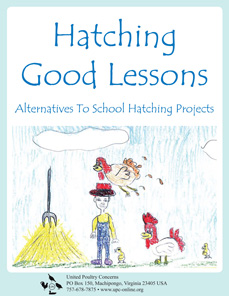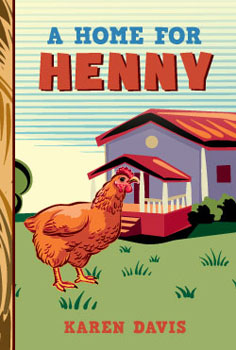Why Choose Alternatives to Chick-Hatching Projects?

Many teachers place fertilized eggs in classroom incubators to be hatched within three or four weeks as a lesson in embryonic development. These projects
are typically conducted in the Spring and Fall of the school year. Chickens, ducks and quails are usually chosen, but mostly chickens. Our booklet Hatching Good Lessons: Alternatives To School Hatching Projects urges teachers to replace these projects with learning activities that
teach life processes without the use of live birds. Here’s why.
Hatching projects encourage the view that animals are disposable objects instead of requiring a lifetime of care and commitment. They encourage children to
want to bring more baby animals into the world, like litters of puppies and kittens that no one wants when the animals grow up. They place a burden on
animal shelters and busy parents who can’t keep the birds, and zoning ordinances often prohibit the keeping of chickens, particularly roosters, even
though more than half of all surviving chickens are going to be roosters. And while children should be learning the importance of veterinary care for
animals who depend on them, most schools do not provide veterinary care for the many birds who are born sick and deformed in these projects.
Hatching-project birds are deprived of a mother hen. This is a big reason why so many classroom chicks are born sickly, dehydrated and crippled. Chick
organs often stick to the sides of the shell as a result of not being turned properly in the mechanical incubator. By contrast, a mother hen turns each of
her eggs, individually, as often as 30 times a day, using her body, her feet and her beak to move each egg precisely to maintain the proper temperature,
moisture, ventilation, humidity and positioning of each embryo she is sitting on. The embryo signals its needs to her, and the hen responds with the
necessary adjustment of her eggs.
Salmonella
is also a concern. More and more children have egg allergies and complications of seasonal flu and vaccines. Dr. Pascal James Imperato, dean of the
Graduate Program in Public Health at the State University of New York, has explained that due to “insufficient regulation of the poultry
industry,” Salmonella is “widespread among chickens and other poultry.” The risk of infection, he said, is “especially high for young children who come into contact with baby chicks and ducklings”
(“Salmonella Common in U.S. Poultry,” The Washington Post, Jan. 23, 2009).
For all these reasons, we urge teachers to replace hatching projects with programs that teach life cycles and inspire students to appreciate, respect, and
learn about the amazing life of birds on our planet and in their own neighborhoods without incubating motherless chicks in machines and hatching them in
barren environments.


-
If you hear that a chick hatching project is being conducted in a children’s classroom near you, please provide the school principal, classroom
teacher, and school district supervisor with a copy of Hatching Good Lessons. This 16-page guide is filled with information, quizzes, stories,
pictures, activities, and curriculum resources for children that teachers, parents and people of all ages will be pleased to teach and learn about chickens
and other birds.
-
Order A Home For Henny for a child, teacher, friend, school library. A Home For Henny tells the story of Melanie, a 3rd grader
who, like her teacher and classmates, is excited about a chick hatching project in her class – until they discover the dark side of the project. A Home For Henny explores the problems with school hatching projects while evoking the lively and sweet personality of the one chicken who is
saved, named Henny, and her loving relationship with Melanie and ultimate adoption by United Poultry Concerns.
To order A Home For Henny ($6.99 for 1, $15 for 5) and Hatching Good Lessons ($2.50 for 1, $5.00 for 5), go to www.upc-online.org/merchandise/humane_child.html or send check or money order to UPC, PO Box 150, Machipongo, VA 23405.
|
|